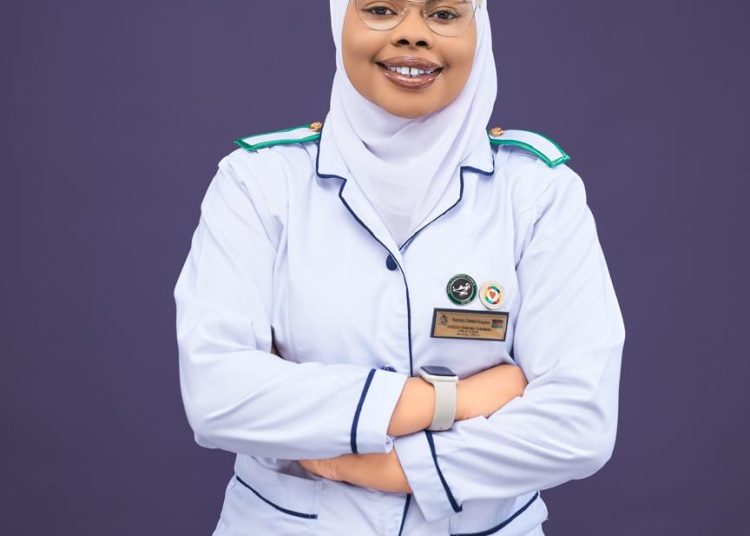On this day when the world celebrates the dignity of work, few professions embody the true spirit of labor more than nursing—work that demands both hand and heart, technical skill and human compassion. Within this community of healers, Fareedah represents a particular harmony between faith and vocation, between professional duty and spiritual calling. As she receives the night report—her attention encompasses both critical medical details and the small human moments that machines cannot measure.
Her crisp white hijab frames a face marked by quiet determination, rectangular glasses perched confidently on her nose, and a warm smile that puts anxious patients immediately at ease. Her story reminds us that our most essential workers bring not just their training to their labour, but their whole selves—their values, their faith, and their unique perspectives that enrich our healthcare system in immeasurable ways.
“Each handover is sacred to me,” she says. “It’s the moment I accept the trust of both my colleagues and patients. That responsibility is something I hold close to my heart.”
As the night team departs, Fareedah turns to face her domain—four beds where Malawi’s most vulnerable mothers fight for their lives.
Roots of Compassion
The path that led Fareedah to this specialized unit wasn’t marked by a single calling but woven from threads of family values, spiritual conviction, and academic excellence.
“I come from a family grounded in high moral values, where compassion and service were deeply emphasized. Nursing felt like a natural extension of those values. A path where I could serve with both my hands and my heart.”
That path took her from Alfalah Islamic Institute to Dedza Girls Islamic School, institutions that nurtured both her faith and her intellect. By the time she reached Kamuzu College of Nursing (now Kamuzu University of Health Sciences), Fareedah had already developed the dual identity that would define her professional life—devout Muslim and dedicated healer.
“Dedza Girls was where I truly began to see education as a bridge between faith and professional excellence,” she says. The disciplined environment there prepared her not just academically but spiritually for the rigors ahead. “It reinforced something essential—that my religious identity and professional aspirations weren’t in conflict. They were complementary forces, each strengthening the other.”
The Myth of Compromise
At the nurses’ station with its blue doors and posted protocols in both English and Chichewa, Fareedah moves with practiced efficiency between monitoring equipment and patient beds. Whether in standard white with navy piping, surgical blue scrubs, or the pink uniform of specialized units, her coordinated hijab creates a seamless professional appearance that honors both hospital standards and her religious commitment.
In the High Dependency Unit, her technical competence is evident in how confidently she operates the vital signs monitors and IV pumps while checking a post-cesarean mother’s wound with meticulous care. Her hands move with confident precision while her hijab—symbol of her faith—remains perfectly in place. The juxtaposition challenges a narrative many Muslim women face daily: that religious observance and professional excellence exist in opposition.
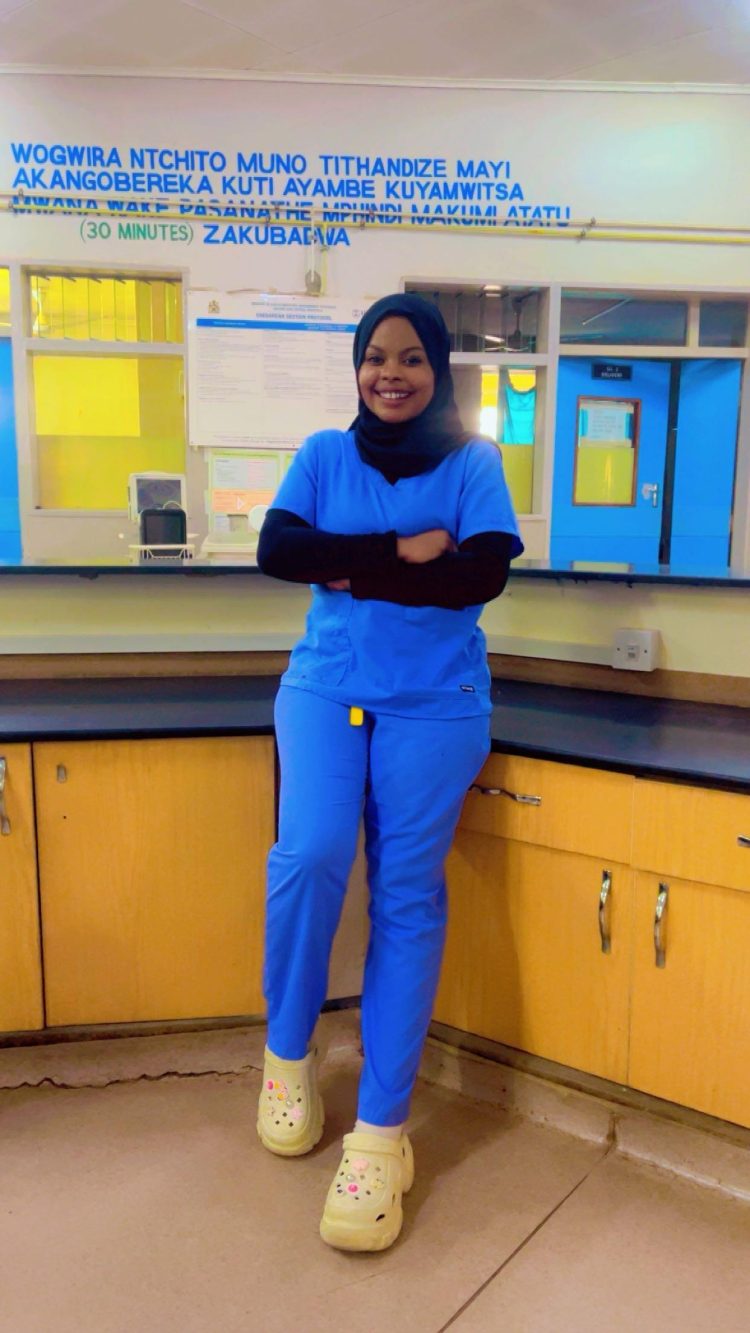
“Thankfully, I have never encountered any negativity or pressure to compromise my religious identity throughout my journey in healthcare,” she says. “Wearing the hijab and practicing my faith have always been respected.”
This acceptance isn’t merely personal good fortune but reflects systemic accommodation worth celebrating: “One of the remarkable aspects of nursing in Malawi is that even the Nurses and Midwives Council recognizes and accommodates Muslim nurses by prescribing a uniform that includes provisions for the hijab.”
The hospital’s support extends beyond daily prayer accommodations. “Yes, the hospital administration has been very supportive,” Fareedah notes. “For example, they allow staff members to take the day off for Eid, and I can use my annual leave to perform Hajj or Umrah. These accommodations make a big difference in ensuring that I can both fulfill my professional responsibilities and stay true to my religious obligations.” This institutional support represents a model of how healthcare systems can honor religious diversity while maintaining excellent patient care.
Her white scarf, long-sleeved white top with navy blue piping, and navy blue trousers stand as a visual testimony that religious identity can be honored within professional standards. In a world where many Muslim women face impossible choices between faith expression and career advancement, Fareedah’s experience offers a powerful counternarrative.
Compassion in Action
The true test of Fareedah’s integration of faith and profession comes in crisis moments that define critical care nursing. The HDU monitor sounds an urgent alarm—a preeclamptic mother’s blood pressure spikes dangerously while her oxygen level plummets. The room suddenly fills with urgent voices and rushing feet.
In this critical moment, Fareedah moves with calm authority, her hands steady as she administers emergency medication while speaking softly to the terrified patient. It recalls another crisis she once described, where spiritual values guided her professional response.
“I once had a patient with severe preeclampsia who refused life-saving medication,” she recounts. “Instead of reacting with frustration, I chose to approach her with patience and calm, drawing on the Islamic principles of mercy and understanding. I took time to listen without judgment, gently explained the treatment, and reassured her that she was in safe hands.”
That patient eventually accepted treatment—a victory not just of medical intervention but of compassionate connection.
“That experience reaffirmed to me that spiritual values are not separate from healthcare—they are often the compass that guides us through the most challenging situations.”
This approach stands in stark contrast to the reputation some nurses have acquired in Malawi’s overburdened health system, where staff shortages and resource limitations can lead to brusque interactions.
“I understand that the workload and pressure can sometimes affect how care is delivered,” she acknowledges, while reflecting empathy for colleagues stretched beyond their limits. “But I make it a personal mission to remain kind, attentive, and respectful, regardless of how hectic the day becomes.”
Her perspective on patient-nurse interactions adds nuance to this picture: “To be honest, I’ve rarely seen nurses act with intentional harshness. What I’ve seen more often are patients being rude or aggressive, while nurses maintain professionalism without even reporting the mistreatment.” Despite these challenges, Fareedah remains committed to compassionate care.
“I often remind myself that for the patient, this might be one of the most vulnerable times in their life. A soft tone, a listening ear, or a few words of comfort can make all the difference between a healing experience and a traumatic one.”
Challenging Perceptions
As morning rounds begin, some people hesitate momentarily upon seeing Fareedah—their surprise at finding a hijab-wearing nurse in the technically demanding HDU barely concealed. By the end of rounds, their expression has transformed to one of respect as Fareedah delivers precise patient updates and anticipates questions with evidence-based observations.
Veronica Chapotera, Senior Nursing Officer and Fareedah’s supervisor, admits she once held similar reservations.
“My first impression was that maybe she would be one of those nurses who lacks compassion when it comes to management of patients.”
“But now I can say that she is not like that—she is unique. She advocates for the welfare of her patients, and she always wishes the best for them.”
This evolution in perception has been replaced by genuine professional appreciation. “Working with her means a lot in the sense that she is a focused person and she knows how to address the patients’ needs comprehensively,” notes Chapotera. “She also has good communication skills.” Such endorsement from senior leadership speaks volumes about how Fareedah’s approach transforms initial skepticism into deep respect.
“One common misconception is that Muslim women, especially those who wear the hijab, are passive, limited in capability, or somehow constrained by their faith,” she says. “That couldn’t be further from the truth. Islam encourages the pursuit of knowledge, service to others, and excellence in one’s work.”
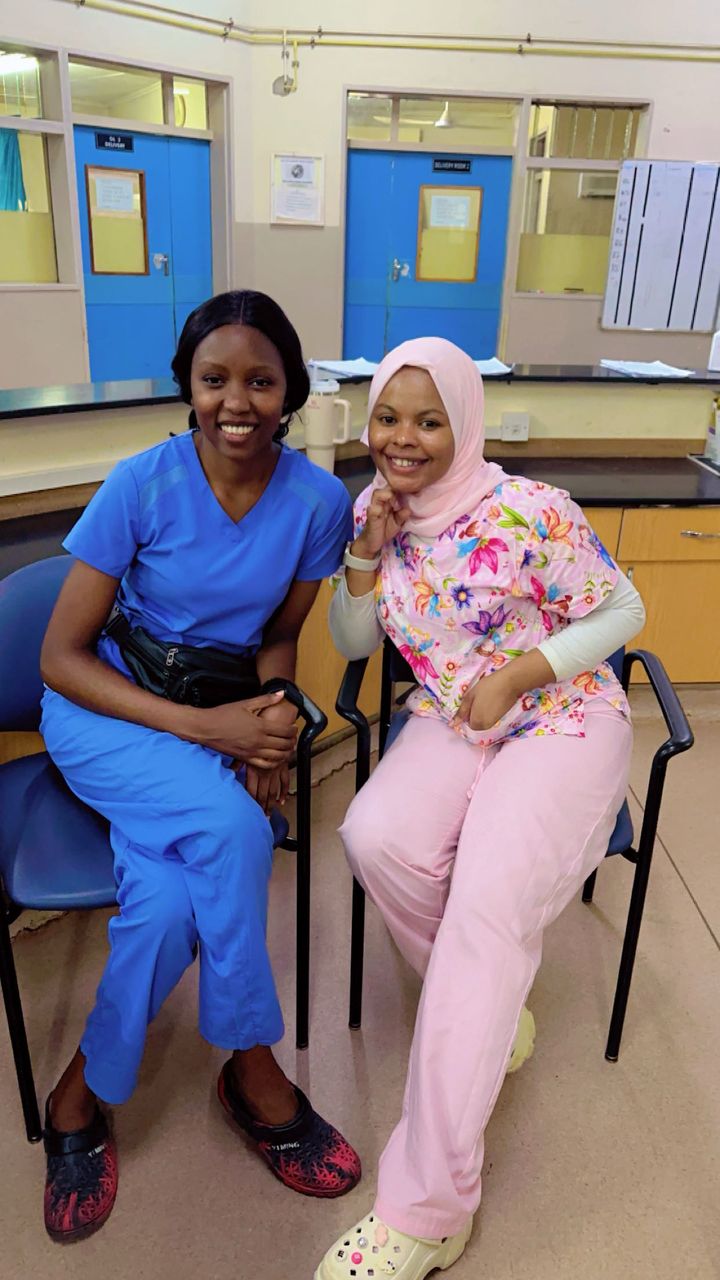
Her technical expertise in managing ventilator settings, interpreting complex cardiac rhythms, and responding to obstetric emergencies serves as a daily, living rebuttal to these stereotypes. Some patients have even verbalized their surprise at receiving such competent care from her.
“Yes, there have been moments when patients expressed surprise, sometimes quietly, sometimes openly,” she admits. “A few have said things like, ‘I didn’t expect someone in a hijab or ‘wachiyao’ as they commonly say to be this warm or gentle.’”
Rather than taking offense, Fareedah sees these interactions as opportunities: “I see these moments as opportunities for positive change. Through consistent, compassionate care, I get to challenge assumptions and open hearts. Sometimes the most powerful testimony isn’t what you say, but how faithfully you serve.”
She’s observed positive changes over time: “I’ve seen a significant shift in attitudes during my career. My colleagues have become more understanding and respectful, and patients seem more open-minded.” This evolution reflects broader social progress that her presence has helped facilitate.
Fareedah also finds unique ways to support Muslim patients: “I can guide them in ensuring that their daily prayers are observed during their hospital stay, help them understand which foods are halal, and offer emotional support in ways that are informed by our shared faith.” This cultural competence adds another dimension to her nursing practice.
Sacred Balance
At midday, as the HDU briefly quiets, Fareedah glances at her watch. In the demanding world of critical care, prayer times wait for no emergency. The logistical challenges of maintaining religious obligations within the unpredictable rhythm of hospital life would defeat many.
“When I was at Queen Elizabeth Hospital, it was tough for me to observe my daily prayers. I worried that my friends might get annoyed with me constantly making excuses to pray. Now that I’ve been transferred to a rural area, I still find it difficult to pray in the hospital environment, even though I have more time now,” confessed one Muslim nurse.
Yet, Fareedah has found her balance.
“It’s all rooted in intention and discipline,” she explains. “No matter how hectic the hospital gets, I prioritize my prayers—they center me, bring clarity, and restore my energy for the challenges ahead.”
From her locker, she retrieves a compact prayer mat. In the washroom, she performs wudu with practiced efficiency before turning toward Mecca. For these precious moments, the sounds of the hospital fade as she connects with something beyond the immediate crisis of flesh and blood.
She keeps her prayer mat and burqa in her locker as a physical reminder that her profession and faith are inseparable aspects of her identity.
“I keep these items as a reminder that this profession is a gift from Allah, and it should never distance me from Him.”
During Ramadan, the balance becomes even more precarious as she maintains fasting while performing physically demanding care. “Fasting during Ramadan while working long shifts is certainly a challenge, but it’s one I embrace with gratitude,” she says. “The sense of spiritual fulfillment at the end of a fasting day, after caring for others, is truly indescribable.”
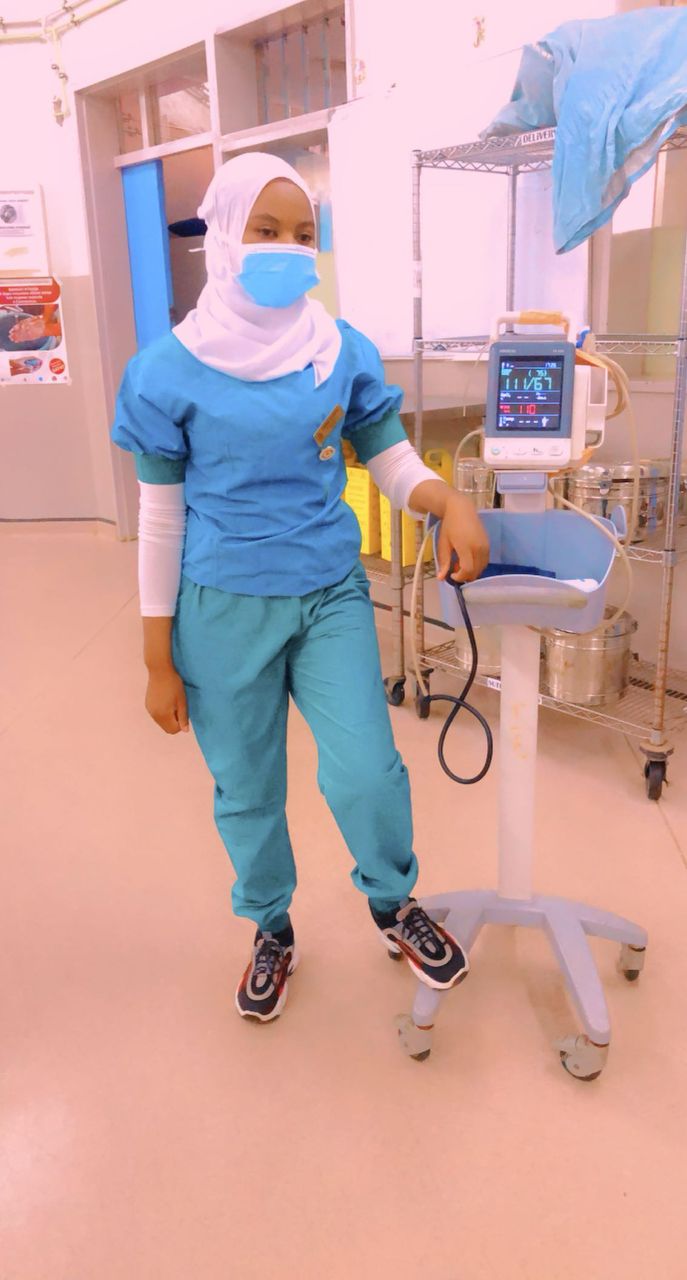
This integration extends to her understanding of nursing itself: “Islam teaches that caring for the sick is a noble act that brings spiritual reward, and nursing upholds the same ethos of selflessness and service. In many ways, being a nurse allows me to live out my faith daily, not just in words but through meaningful action.”
Fareedah notes that her faith and medical practice exist in harmony: “I’ve never encountered a situation where medical practices conflict with Islamic principles. Islam is not a strict religion; in fact, it encourages seeking medical treatment when needed.” This perspective helps her navigate both worlds with confidence.
A Legacy of Life
Between emergency interventions in the HDU, Fareedah’s thoughts occasionally drift to her five years in the Labour Ward, where new life emerged daily under her watchful care. When asked about her proudest moments, her face transforms with a joy reserved for midwifery—perhaps her most profound calling within nursing.
“My proudest moments have come through my work as a midwife, especially those critical instances when I identified complications early during labor and intervened just in time to save both the mother and baby,” she says, remembering lives preserved through her vigilance.
Her hands—the same hands that now adjust oxygen flow and monitor post-surgical wounds—have guided countless infants into the world. “There’s nothing more fulfilling than seeing a mother safely holding her newborn, knowing you played a part in that miracle. Those moments remind me why I chose this path and why I stay committed to it every single day.”
Though now rotating through the High Dependency Unit, her vision extends beyond individual care to systemic improvement: “I hope to continue advocating for respectful maternity care, early identification of complications, and better outcomes for mothers and babies.” Her eyes take on a visionary quality as she considers her legacy: “I want to contribute to the development of a generation of well-trained nurses and midwives who truly understand the science behind their profession—who serve with both heart and knowledge.”
Beyond Hospital Walls
The balance Fareedah maintains extends beyond hospital walls, though the demands of critical care nursing make this balance particularly challenging. For many healthcare professionals, especially women, the responsibilities of home life create another dimension requiring careful integration with professional duties.
“Balancing faith, work, and home life is all about intention,” Fareedah explains.
“As a Muslim wife and mother, I center my daily routine on intention as Islam teaches us that actions are judged based on intentions and everyone will be rewarded according to what they intended. So whether it is to play with my son or make my husband smile, I take that as an act of worship.”
Her approach reflects the same mindfulness she brings to patient care, but in a different context. “At the hospital, I give my best to my patients, but once home, my focus shifts to nurturing my family and being present. I also make time for social connections and community even with just being a good neighbor. This keeps me balanced and emotionally fulfilled.”
Rather than striving for an impossible perfection in every domain, Fareedah embraces a more sustainable philosophy: “It’s not about doing everything perfectly, it’s about being present and intentional in each role.” This integration of domains is another example of how she refuses compartmentalization—creating instead a holistic approach to life where values flow seamlessly between spaces, enriching both.
Mentoring the Next Generation
As the afternoon progresses, a nursing student in her clinical rotation watches Fareedah with undisguised admiration. The student—also in hijab—sees in Fareedah something profoundly important: possibility.
As a trailblazer who has successfully integrated her Muslim identity with nursing excellence, Fareedah has become a natural mentor to younger Muslim women considering healthcare careers. Her advice carries the authority of lived experience rather than hollow platitudes.
“I always tell them: your faith is not a limitation—it’s a source of strength,” she says with quiet conviction while guiding the student through a complex fluid calculation. “If you carry yourself with integrity and remain committed to excellence, you can thrive in any environment, any specialty, any role you choose.”
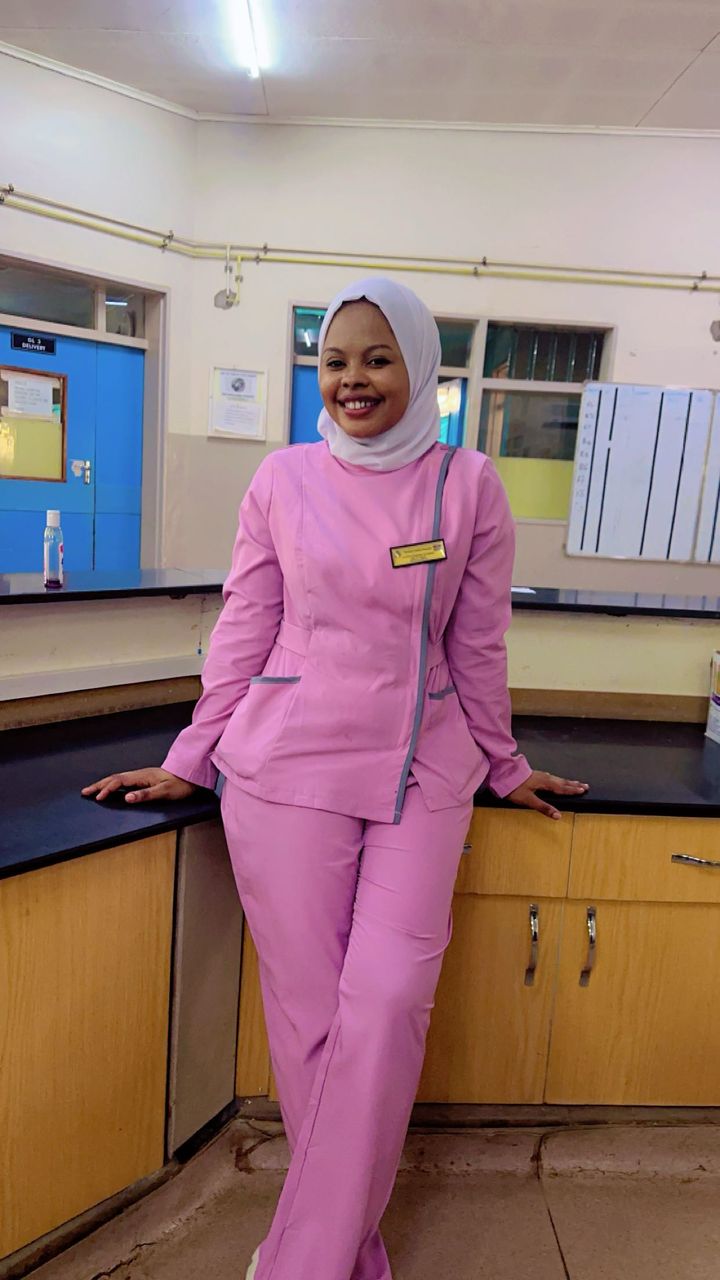 To young Muslim girls specifically, her message is direct and empowering: “You don’t have to choose between your faith and your career—you can carry both with pride. Nursing is a noble profession that thrives on compassion, discipline, and integrity, all qualities that Islam encourages in its followers.”
To young Muslim girls specifically, her message is direct and empowering: “You don’t have to choose between your faith and your career—you can carry both with pride. Nursing is a noble profession that thrives on compassion, discipline, and integrity, all qualities that Islam encourages in its followers.”
The mentorship extends beyond individual guidance to Fareedah’s vision for Malawian healthcare: “I dream of contributing to the development of a generation of healthcare workers who truly understand both the science and the soul of medicine. Empowering healthcare workers with knowledge, confidence, and compassion can transform our entire system for the better.”
The Quiet Revolution
Evening approaches, casting long shadows across the HDU. Fareedah prepares for another sacred ritual—the handover to night shift. She reviews each patient’s status with meticulous attention, updating fluid balance charts and medication responses in the handover book. Every detail matters; lives depend on this careful transfer of knowledge.
Her daily responsibilities encompass creating a clean and safe environment, administering medications with precision, participating in multidisciplinary ward rounds, monitoring vital signs, and documenting every intervention. Each task she approaches with both technical skill and human compassion.
Her attention to detail—ensuring every aspect of each patient’s status is accurately communicated—reflects her understanding that excellent healthcare is built on accountability and continuity. Patient by patient, she transfers not just information but responsibility for lives in precarious balance.
When she finally removes her nurse’s cap at shift’s end, her hijab remains—a seamless transition from one aspect of her identity to another. This integration represents her most powerful statement in a world that often demands compartmentalization.
Fareedah represents a quiet revolution in Malawian healthcare—not through grand pronouncements or political activism, but through daily excellence that silently expands possibilities. Her presence in the hospital corridors challenges patients, colleagues, and the broader community to reconsider limiting assumptions about Muslim women.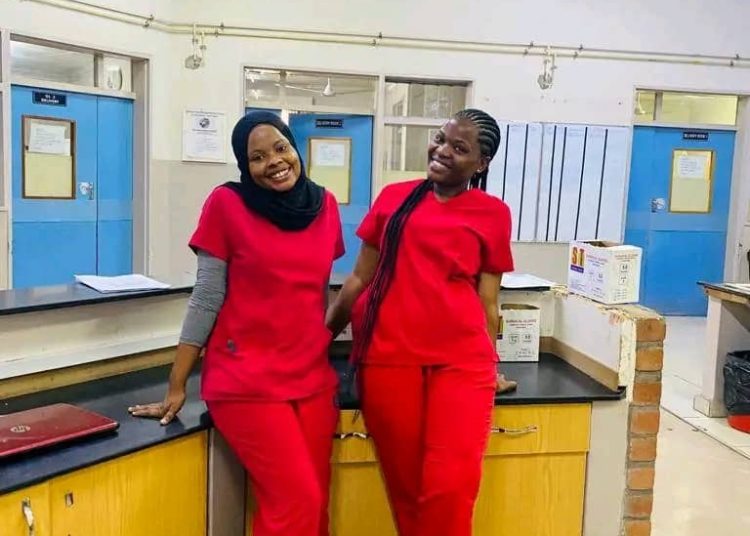
“I believe my presence challenges assumptions in a quiet but powerful way. When patients and colleagues see Abiti—a nurse in hijab offering competent, compassionate care in even the most technical environments—it naturally breaks stereotypes without a single word being spoken.”
As she walks through the hospital gate and into the evening air, Fareedah carries with her not just the satisfaction of patients served but the knowledge that her very existence in this space is redrawing the boundaries of what’s possible for Muslim women in Malawi. Her warm smile acknowledges the gatemen who wave her through with evident respect, another small testament to the relationships she builds across all levels of the hospital community.
Fareedah carries with her not just the satisfaction of patients served but the knowledge that her very existence in professional spaces like these is redrawing the boundaries of what’s possible for Muslim women in Malawi. Her journey stands as testimony that the most profound revolutions often happen not in grand gestures, but in the faithful stewardship of daily moments—where compassion meets competence, and faith finds expression in service.

